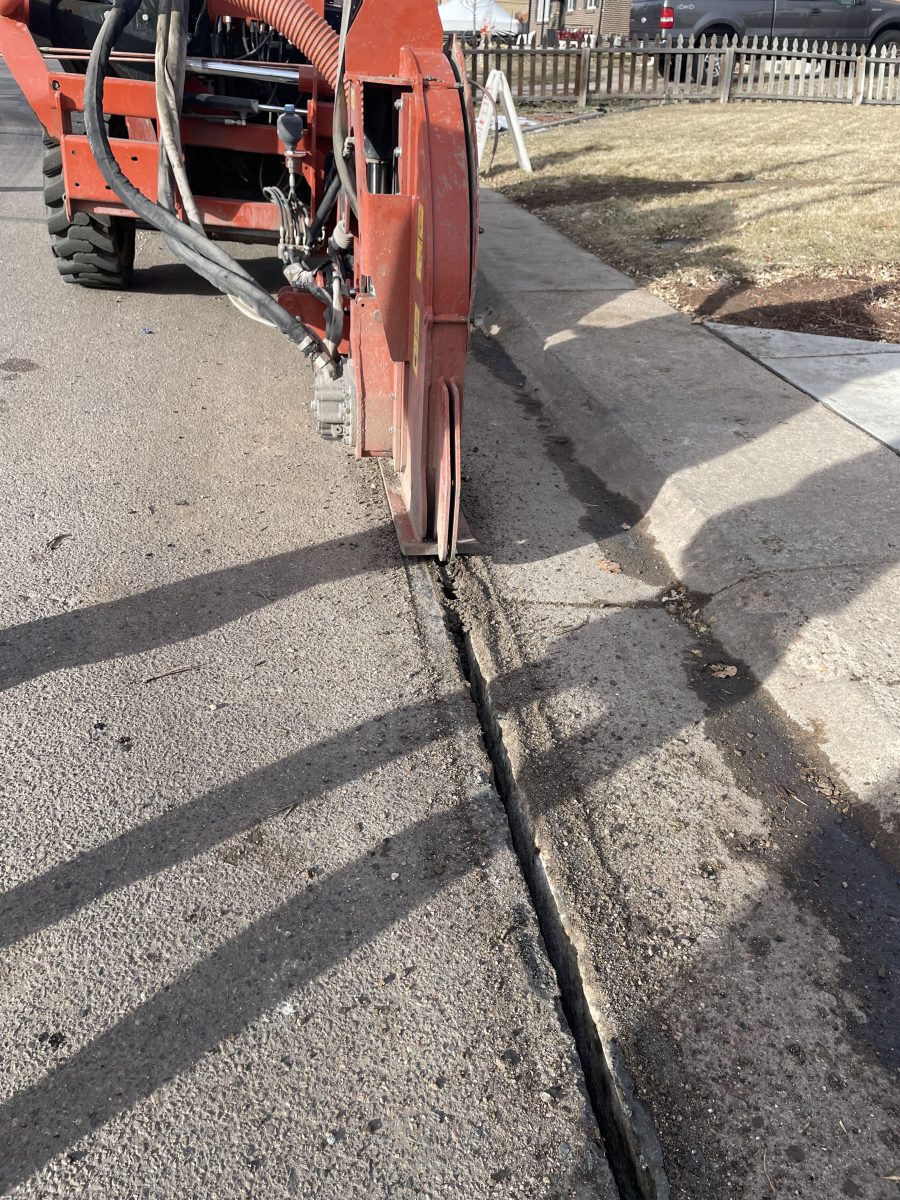Quick links: BEAD’s big deal | Next GFiber cities in Colorado | Lumen updates | Natural Grocers turns 70 | More
While many in the broadband industry converged in downtown Denver this week to talk about changes to federal broadband funding, down south in Highlands Ranch on Tuesday, the GFiber team broke ground for fiber-internet service that aims to cover unincorporated Douglas County.
“We try to put our infrastructure within the entire community and then we let people know that, hey, you’re eligible for Google Fiber service,” said Alberto Garcia, GFiber’s government and community affairs manager. “Our plan is to cover as many homes as possible.”
GFiber, which used to be called Google Fiber, is planning to expand in several more Denver-area communities, but also in other cities and towns around the state that want to work with the company. And that’s without public funding like the Broadband, Access, Equity and Deployment program, a $42.5 billion plan to use federal money to invest in broadband infrastructure in neglected parts of the U.S.
“We believe we have the resources to have deployment to a number of areas,” Garcia said. “BEAD funding may be more applicable to some of the smaller providers who can go out and say, with this money, with this resource, we can go to these other communities.”
BEAD has been a big topic of discussion in the broadband community since Congress approved the program in 2021. But a new twist came June 6, when the Trump administration changed the rules on how the money could be doled out, changing criteria to the most affordable, technology neutral technology. The faster but more expensive fiber technology took a back seat to wireless and satellite applications, at least in Colorado.
 Mountain Connect held its broadband conference at the Sheraton Denver Downtown Hotel between August 4 to 6. (Tamara Chuang, The Colorado Sun)
Mountain Connect held its broadband conference at the Sheraton Denver Downtown Hotel between August 4 to 6. (Tamara Chuang, The Colorado Sun)
At the Mountain Connect Broadband Development Conference in Denver earlier this week, state broadband officials shared what happened after the process was rebooted.
“Overall, our providers are ready to go. They were ready to go nine months ago. They have planning and contingencies in place to get the work done,” said Thomas Tyler, deputy director of Louisiana’s state broadband office ConnectLA, during a panel at the conference.
Last fall, Louisiana became the first state to announce contracts with internet providers. The plans were approved in January by the National Telecommunications and Information Administration, which oversees the BEAD program. All those had to be pulled back.
“We called every single one of them to ensure that they would try to participate again and weren’t getting cold feet,” Tyler said. “We needed them to support the state.”
Colorado is on track to meet the Sept. 4 deadline of picking new internet providers. Then the NTIA has 90 days to approve, which could mean some projects could start next year, weather permitting.
Brandy Reitter, executive director of the Colorado Broadband Office, said even if GFiber didn’t apply for public funding, they are adding more broadband competition in the metro areas, which likely didn’t qualify for BEAD funding anyway.
“High-cost areas often require public subsidies, and our office helps support the business case for private investment in those regions,” Reitter said in an email. “GFiber’s investment without public subsidies is a positive development. They are providing customers along the Front Range with more options in areas that currently have only one or two providers. This not only adds a new choice but also promotes competitive pricing, diverse service offerings, and improved customer service among providers.”
GFiber’s plans for Colorado
GFiber is still part of the Google family via parent Alphabet. It started with a splash in 2012 when Kansas City, Missouri, became its first city, but expansion plans petered out as the upstart caused competitors to, well, compete. Google hit pause on new cities in 2016.
But things have picked up again for GFiber, especially in Colorado. While the company launched a fixed-wireless service in Denver in 2017 called Webpass, it announced its first fiber plans in Lakewood in late 2022. Its fiber-to-the-home service has been available in the city since last year
 Google’s GFiber internet service gets installed in Lakewood. (Handout)
Google’s GFiber internet service gets installed in Lakewood. (Handout)
Then neighboring cities and counties began reaching out.
“Communities contacted us and said, ‘Hey, what about us? What about here?’ So you started to see us expand out from Lakewood,” Garcia said.
GFiber declined to disclose the cost of their fiber investment, but companywide, it’s building both main pipes, also called the “middle mile,” throughout cities and counties, and the “last mile,” to install fiber from the main pipe to customer homes.
Besides Highlands Ranch, construction is underway in Westminster and Wheat Ridge, and is about to start in Broomfield. Agreements have been signed in Golden and Adams County for its unincorporated areas.
While construction and weather delays may happen, Garcia said service could be turned on by the end of the year in Westminster; first or second quarter next year in Wheat Ridge; and second quarter next year for Highlands Ranch.
All areas will have the same monthly pricing and speeds as Lakewood, currently $70 for 1 gbps, $100 for 3 gpbs and $150 for 8 gbps.
“If there’s anything that’s sacred in the company, it’s the pricing structure,” Garcia said. “Kansas City, Missouri, was our very first city in 2012 and when we started, we offered one gigabit of service for $70 a month. That price has not gone up.”
Highlands Ranch has another fiber-internet provider, BAM Broadband, formerly DirectLink. The unincorporated metro district also has Comcast, Lumen (previously CenturyLink) and satellite options. Competitive fiber options have become a thing in the 21st century.
“We’re just excited to allow our residents options for their internet provider,” said Rebecca Ruiz, with the Highlands Ranch Community Association.
The company that many Coloradans had once called CenturyLink or Qwest did not apply for any BEAD funding, according to Mark Molzen, Lumen’s global issues director.
Some wondered about it after spotting a June 6 letter to the Federal Communications Commission that Lumen Technologies was ending its pursuit of deploying gigabit internet in Colorado and other states as part of an older federal program known as the Rural Digital Opportunity Fund. CenturyLink had been awarded $7.5 million.
Lumen is in the process of selling its consumer fiber operations to AT&T, though the sale isn’t expected to be final until next year. The company plans to keep its enterprise fiber operation to target business customers.
As for its nonfiber internet services? Those are staying with Lumen.
“Lumen will continue to care for its existing copper-based mass market customers through this transition,” Molzen said in an email. “Over time, we expect customers will choose to move to more modern services offered by other providers, including fiber-based or wireless services. Lumen’s commitment to customer continuity remains unchanged.”
➔ICYMI: Fiber broadband industry connects in Denver after $42.5B federal program upended. The wireless industry feels it finally gets a chance. Satellite internet remains a big presence in the shadows of Mountain Connect. >> Read story
Sun economy stories you may have missed
 Gov. Jared Polis speaks before signing a housing bill into law on Tuesday, May 13, 2025, in Denver, Colorado. (Jesse Paul, The Colorado Sun)
Gov. Jared Polis speaks before signing a housing bill into law on Tuesday, May 13, 2025, in Denver, Colorado. (Jesse Paul, The Colorado Sun)
➔ Colorado governor calls special legislative session to deal with nearly $1B budget hole, artificial intelligence law. Lawmakers will return to the Capitol on Aug. 21. >> Read story
➔ How state wildlife officials tracked down the source of zebra mussels in the Colorado River. Western Colorado farms, orchards and vineyards are worried the invasive species will move from the Highline canal into their irrigation systems. >> Read story
➔ EPA cancels $7 billion Solar for All grant program to boost green energy. The Biden-era clean energy program included $156 million already awarded in Colorado. >> Read story
➔ Denver’s minimum wage is going up, so is Colorado’s. Here’s what they’re expected to be next year. >> Read story
➔ Is “growing food illegal” in Teller County? A family who built a greenhouse at 9,200 feet is ordered to tear it down. >> Read story
➔ Hot Colorado labor trend alert: Working past 65. 65-plus year olds are part of Colorado’s fastest growing age group of workers. >> Read story
Other working bits
 Produce assistant at Natural Grocers, Leslie Miller, stocks the stocks the apples in the produce section, Friday, Nov. 18, 2022, in Golden. (Hugh Carey, The Colorado Sun)
Produce assistant at Natural Grocers, Leslie Miller, stocks the stocks the apples in the produce section, Friday, Nov. 18, 2022, in Golden. (Hugh Carey, The Colorado Sun)
➔ Natural Grocers turns 70. The longtime Colorado-based grocer, founded by Margaret and Philip Isely in Golden in 1955, celebrates its 70th anniversary this month. That includes a special new blend of coffee, pecan caramel pie and other specials for a three-day event starting Aug. 14.
Fun fact: The first official store actually opened at 9030 W. Colfax Ave. in Lakewood on Jan. 1, 1955. But August is the celebration month “because that is the birthday month of our beloved co-founder Margaret Isely,” said spokesperson Katie Macarelli. Headquartered in Lakewood, the grocery chain has 169 stores in 21 states. >> NG’s origin story
➔ Denver housing prices drop again. Two reports out in the past week put the price of living in Denver is slightly down from a year ago. Median rents in July were flat, down -0.8% from a year ago to $1,494 a month for a one bedroom and $1,861 for a two-bedroom apartment, according to ApartmentRents, which tracks monthly rents nationwide.
Meanwhile, the median closing price for a house sold in Denver last month was $590,000, a 1.67% decline from a year ago, but also down 3.28% from June, according to the Denver Metro Association of Realtors. Active listings swelled by 32% from a year ago to nearly 14,000 for sale homes in the Denver metro. Statewide data should be out next week. >> Denver data
➔ Apprenticeships in Colorado get a boost. The state, which passed a law in 2021 to create an official state apprenticeship agency, just named 12 organizations as new intermediaries to help local businesses and industries create job-training programs of their own.
Organizations like Arapahoe Community College, Chef Ann Foundation and the Trailhead Institute can help employers or job seekers get questions answered about how to find new workers or employers. They join 35 that were recognized last year, according to the state Department of Labor and Employment. >> Search the list
Got some economic news or business bits Coloradans should know? Tell us: cosun.co/heyww
Thanks for sticking with me for this week’s report. As always, share your 2 cents on how the economy is keeping you down or helping you up at cosun.co/heyww. ~ tamara
Miss a column? Catch up:
What’s Working is a Colorado Sun column about surviving in today’s economy. Email tamara@coloradosun.com with stories, tips or questions. Read the archive, ask a question at cosun.co/heyww and don’t miss the next one by signing up at coloradosun.com/getww.
Support this free newsletter and become a Colorado Sun member: coloradosun.com/join
Corrections & Clarifications
Notice something wrong? The Colorado Sun has an ethical responsibility to fix all factual errors. Request a correction by emailing corrections@coloradosun.com.
Type of Story: News
Based on facts, either observed and verified directly by the reporter, or reported and verified from knowledgeable sources.


